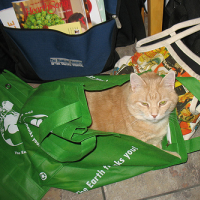Critics Queasy over Report that Plastic Bag Ban Makes People Sick

A six-month-old study making the rounds of media outlets lately is turning stomachs and generating an unhealthy amount of head scratching. Can it be true that plastic bag bans, passed by more than 40 cities and counties since 2007, are responsible for significant increases in E. coli?
That’s the conclusion of “Grocery Bag Bans and Foodborne Illness,” a report by law professors Jonathan Klick and Joshua D. Wright, that has received less-than-glowing reviews from environmentalists and plastic bag ban advocates.
Klick and Wright studied emergency-room statistics in San Francisco just after the county became, in 2007, the first jurisdiction to ban plastic bags, and found a 46% rise in food-borne illness. That translated, they said, to somewhere between 5.4 and 15.8 deaths.
The culprit, they deduced, was E. coli, a bacteria that can cause serious food poisoning. While noting that “the literature on the health risks of reusable grocery bags is sparse,” they none-the-less concluded that the plastic bag ban had driven people to reusable bags, illness and death.
Dripping juices from meats mingled with fruit, vegetables and other food were turning reusable bags into plastic and cloth Petri dishes teeming with bacteria. Washing reusable bags pretty much eliminates the threat, but few people do that.
The researchers also delved into the monetary costs of bag bans. First, they calculated the break-even point for the loss of human life based on the U.S. Environmental Protection Agency’s “current estimate of the value of a statistical life,” which, if you’re curious, is $8.4 million. They then computed the implied cost of saving an animal from plastic bag pollution at between $87,500 and $307,500.
Needless, to say, this suggested to them “that the current trend toward bag bans may be imprudent.” Critics of the bag bans complain of government overreach, inconvenience, unnecessary expense and environmental protection run wild. Supporters of the bans note that 100 million plastic grocery bags are chucked into the environment nationally every year. The bags are nonbiodegradeable, toxic and a danger to habitats and species from birds to plankton.
Skeptics of the study have noted the small statistical sampling taken over a limited time period in a single jurisdiction known for some uncommon demographics. The study was not peer reviewed. Others have questioned how reusable bags would have contributed to an E. coli spike in 2007, when many stores and people were still making the transition using disposable paper bags.
Jennie Romer, Atlantic region director of the Clean Seas Coalition, didn’t think much of the science, the statistics or the conclusions in the report. She wrote on her website, PlasticBagLaws.org, “This is just another example of plastics industry groups grasping at straws to use PR campaigns to fight against plastic bag ordinances.”
The Klick-Wilson study came to many of the same conclusions reached in a 2010 report from researchers out of the University of Arizona, Tucson and Loma Linda University in California. That study was roundly castigated for being funded by the American Chemistry Council (ACC), a trade group that advocates for the plastic bag industry.
The council and its members spent more than $333 million lobbying Congress and federal agencies between 2005 and 2012, according to the Center for Effective Government (formerly OMB Watch). It spent heavily to stop government agencies from designating formaldehyde, styrene, and chromium as carcinogens.
The author Wright, a George Mason University professor, was appointed last month to the Federal Trade Commission by President Barack Obama to fill a seat vacated by a Republican. Wright has a lengthy record of advocating against anti-trust enforcement and government regulation. Klick, a law professor at the University of Pennsylvania and an economist at RAND, is associated with the Cato Institute, a libertarian think tank.
–Ken Broder
To Learn More:
S.F.'s Plastic Bag Ban May be Unhealthy (by Debra J. Saunders, San Francisco Chronicle)
Plastic Bag Ban Could be in Sacramento's Future (by Ryan Lillis, Sacramento Bee)
Plastic Bag Ban Responsible for Spike in E. Coli Infections, Study Says (by Aaron Sankin, Huffington Post)
Can Reusable Grocery Bags Make you Sick, or Is that Just Baloney? (Consumer Reports)
Grocery Bag Bans and Foodborne Illness (by Jonathan Klick and Joshua D. Wright, Wharton School Institute for Law and Economics)
Recent “Study” Relating E.coli Infections to Plastic Bag Bans Is Misguided (by Jennie R. Romer, PlasticBagLaws.org)
- Top Stories
- Controversies
- Where is the Money Going?
- California and the Nation
- Appointments and Resignations
- Unusual News
- Latest News
- California Forbids U.S. Immigration Agents from Pretending to be Police
- California Lawmakers Urged to Strip “Self-Dealing” Tax Board of Its Duties
- Big Oil’s Grip on California
- Santa Cruz Police See Homeland Security Betrayal in Use of Gang Roundup as Cover for Immigration Raid
- Oil Companies Face Deadline to Stop Polluting California Groundwater





